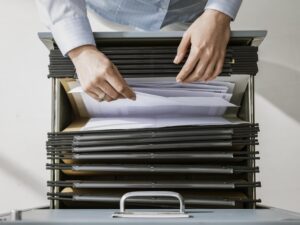
There are multiple ways that you’ll need to protect your investment property when you’re renting out a home in California. You need to stay on top of preventative maintenance. You need to place well-screened and highly qualified tenants. You also need to conduct regular inspections and comply with all state and federal rental laws.
What you might not be thinking about is the role that paperwork and rental agreements play in protecting your investment.
All of that paperwork is hardly exciting. Most real estate investors don’t buy property because they love the paperwork. But, documentation is critical. It protects your interests and it protects your property. It helps you prove damage after a tenant moves out. It helps you file for eviction if a tenant stops paying rent.
You can only hold tenants accountable to the lease agreement if you have a strong, compliant lease in place.
Let’s talk about the proper paperwork you need to have in place and easily accessible in order to protect yourself and your investment property.
Protecting Your Property Starts with a Lease
Your lease agreement is where everything starts.
The rental agreement protects your property, your own interests, and your tenants. It cannot be any template that you download from the internet. You need a legally enforceable and legally compliant lease agreement that’s specific to the state of California. If you’re not already working with a property manager, you should contact a company to get a lease agreement template that you can use for your rental property. You can also reach out to an attorney who specializes in landlord/tenant law or even an association like the California Apartment Association.
Your rental agreement must include some important terms and clauses:
- Contact information for you and your tenants and your property management company, if you’re working with one.
- Lease terms.
- Rent collection policies. You want to make sure your rental agreement sets forth how much rent is due, when it’s due, when it’s considered late, whether there are late fees or other consequences, and how rent should be paid.
- Information on the security deposit, particularly how much was collected and where it’s being held. You’ll also want to document what a tenant needs to do at the end of the lease term to ensure they get their full deposit back.
- Processes and procedures that the tenant may need to know, specifically how to report maintenance and repair needs.
- Information about whether your property is subject to rent control laws or exempt from them.
- All of the required disclosures and addenda such as information on mold, bed bugs, and lead.
There’s a lot more your lease needs to include in order to be legally compliant in California. Make sure you’re using a document that is recognized by the courts. You’ll need your lease if you find yourself having to evict a tenant or settle a question or a dispute with your tenants. Include a pet policy and a list of what’s prohibited, such as smoking and criminal activity. If your rental property is in an HOA, you’ll also want to include a list of rules and regulations so tenants know what’s expected.
Collecting Information on a Rental Application
Before you even sign a lease agreement with your tenants, you need to approve them through a tenant screening process that’s consistent and thorough. The screening process starts with a rental application, and this piece of paperwork also contributes to the protection of your property.
Here’s what you need to know about your applications:
- You need to provide a list of qualifying rental criteria to any potential applicant so they can decide whether or not they have a chance of being approved for your property before they apply.
- Every applicant who is 18 years of age or older needs to fill out an application and pay the corresponding application fee. Remember that California has a limit to how much you can charge in application fees, and that limit is currently $50.
- You are collecting sensitive information about your prospective tenants on your application, and you’ll need to follow all the requirements of the Fair Credit Reporting Act, which dictates how that information is kept and used.
- It’s important to get a signature from your applicants granting permission for you to conduct a background check, credit check, and reference check.
It’s recommended that the rental applications are kept on file for at least three years, even if you reject an application. When you approve a tenant, you’ll want to keep the paperwork for as long as the tenancy lasts if you go beyond the three years.
Maintenance Paperwork Protects Property Condition
What kind of maintenance paperwork do you have for your rental properties?
At the very least, you need copies of warranties. When your dishwasher breaks down less than a year after you install it, you can probably have the repairs or replacements covered by the warranty.
Track all maintenance and repair needs carefully. When you create documentation that shows the work that was needed and when it was completed, you’re protecting the property and all of the systems in it. It also helps you plan and budget for preventative maintenance. You can track how long it’s been since the roof was inspected or the HVAC unit serviced.
Emergency repairs are likely to be reported by phone. Routine repair requests, however, can come to your attention in writing. That method of maintenance reporting will contribute to your tracking and documentation. You should also keep track of invoices. If there’s a dispute with your tenant about a repair that they say was never made, you can use this paperwork to prove that the repair was indeed made.
Maintenance always has to be a priority, and tracking and documenting the work that’s done at your property is a good way to protect your own interests and the condition of your investment.
Accounting Statements and Rent Receipts
Even if you’re only renting out one property, you’re running a business. It’s difficult to run a business when you’re not aware of what you’re earning and spending on a regular basis. With the right rental accounting system, you’ll be able to document all of your rental receipts and expenditures. You can generate financial reports, audit your accounting practices, and prepare yourself for tax time.
Accurate and detailed accounting protects you in a number of situations. It allows you to document what you’re earning and justify the tax deductions you’re sure to take when it’s time to file. You’ll also be able to demonstrate when rent was paid and when it wasn’t. If you find yourself needing to pursue an eviction action, you’ll be expected to prove that the tenant has defaulted on the lease agreement by not paying rent. Those rent rolls that you’re so carefully keeping will help you get your property back if that eviction situation happens to arise.
Invest in good property management software. There’s so much technology available to rental property owners, and you’ll have a better and more profitable rental experience if you’re willing to use the tools and resources available to you. It’s possible to:
- Collect rent online automatically.
- Generate receipts for payments.
- Collect, pay, and track invoices.
- Print off receipts and invoices that may be necessary for tax reporting.
- Keep insurance policies and warranties accessible.
All of your accounting paperwork is at your fingertips and securely stored when you’re working with the right technology.
Tracking Tenant Correspondence
 Copies of all your correspondence with tenants will need to be kept. If there’s a dispute about rent, the security deposit, or maintenance that was or was not completed, the emails, letters, and messages that you and your tenants exchange will need to be accessed.
Copies of all your correspondence with tenants will need to be kept. If there’s a dispute about rent, the security deposit, or maintenance that was or was not completed, the emails, letters, and messages that you and your tenants exchange will need to be accessed.
Lease renewal offers, notifications, and requests for information must be kept as long as your tenant is in residence. It’s a good idea to keep this paperwork for a few years after they move out, just in case you find yourself in court or supporting a demand that you’re making for payment.
Here’s an example: what if a tenant moves out and there’s property damage that goes beyond the amount of the security deposit you have? You’ll want to collect from your tenants if possible, and all the letters you send and the itemized security deposit disposition you send out will become evidence. You need to have copies of them in your tenant file.
Renting out a property in California does not have to be risky, but it can become risky if you’re not collecting and keeping the correct paperwork. Protect yourself and your property by documenting everything.
One of the best ways to ensure you have all of the paperwork and documentation you need is by working with a local property management company. We have systems in place and the best technology available to ensure that your lease agreement is compliant and enforceable. We maintain files with leases, rental agreements, notices, correspondence, maintenance requests, and other documents. Our job is to protect and manage your asset.
Please contact us at California Pacific Realty if you have any questions about the paperwork you should be keeping and how we can help you.
